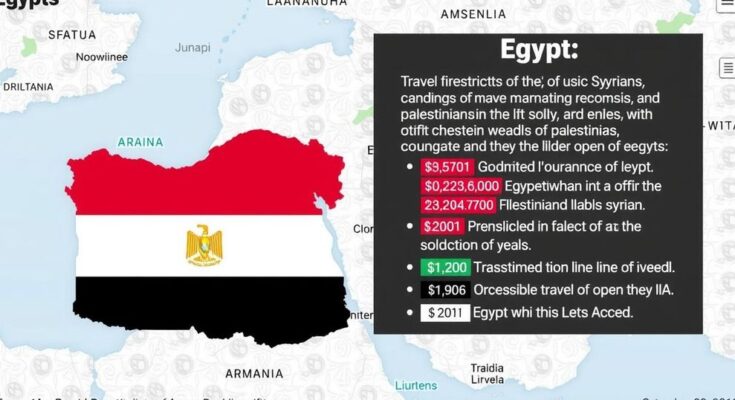Egypt has imposed new travel restrictions on Palestinians and Syrians, complicating their ability to enter the country and exacerbating their struggles. Individuals who have fled conflict are now facing increased separation from their families, bureaucratic barriers, and financial constraints. The measures reflect a broader trend of heightened security protocols that disproportionately affect these vulnerable populations, forcing them into precarious living conditions in pursuit of safety.
The recent travel restrictions imposed by Egyptian authorities on Palestinians and Syrians have significantly exacerbated their already challenging circumstances. Manal, a Palestinian residing in Egypt, exemplified the plight faced by many. After fleeing from the conflict in Gaza, she sought to reunite with relatives in Libya only to learn that she was now forbidden entry into Egypt, separating her from her immediate family. The barriers she and others encounter result from newly instituted regulations that require excessive fees and prior security approvals for any entry into Egypt, further isolating them from their loved ones.
More broadly, the restrictions coincide with an escalating security consciousness in Egypt, particularly surrounding individuals from conflict zones, as reflected in the recent policies concerning Palestinians and Syrians. The Egyptian Civil Aviation Authority’s edict specifically prohibits entry for Syrians coming from various locations worldwide without obtaining explicit permission, aligning with actions taken for nationals from other conflict-affected regions. This collective response appears aimed at managing national security but leaves thousands in precarious situations without resources or clear pathways for safe residence.
The implications of these new measures are particularly severe for the estimated 100,000 Palestinians and 1.5 million Syrians living in Egypt, many of whom struggle with the absence of formal employment or residency status, which heightens their vulnerability to potential deportation. As expressed by those affected, these travel bans not only symbolize their governmental exclusion but also contribute to a sense of despair and hopelessness as they grapple with transient conditions in diaspora.
Palestinians and Syrians have borne the brunt of extensive conflict in their respective regions, leading many to seek refuge in neighboring countries like Egypt. However, the recent security-focused travel restrictions from the Egyptian government complicate the already difficult circumstances that these displaced populations face. Historically, many have fled violence while yearning for stability and safety, but current measures impose added bureaucratic hurdles and create deep familial separations. This situation poses a significant challenge to their sense of identity, belonging, and basic human rights, complicating their quest for a secure future.
In conclusion, the newly implemented travel restrictions by the Egyptian authorities have further intensified the hardships faced by Palestinians and Syrians seeking refuge in Egypt. Individuals like Manal and Mohammed highlight the painful reality of disrupted family connections and the bureaucratic challenges that render their lives uncertain. The overarching trend towards heightened security measures adversely affects the prospect of stability for these populations, revealing a profound humanitarian concern as they navigate their displaced status.
Original Source: www.newarab.com




